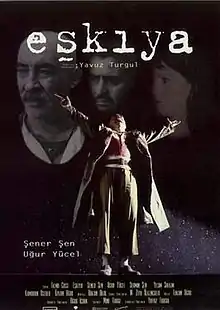The Bandit (1996 film)
The Bandit (Turkish: Eşkıya) is a 1996 Turkish film written and directed by Yavuz Turgul and starring Şener Şen and Uğur Yücel.
| Eşkıya | |
|---|---|
 Movie poster for Eşkıya | |
| Directed by | Yavuz Turgul |
| Written by | Yavuz Turgul |
| Produced by | Mine Vargı |
| Starring | Şener Şen Uğur Yücel Sermin Şen Yeşim Salkım |
| Cinematography | Uğur İçbak |
| Edited by | Hakan Akol Onur Tan |
| Music by | Erkan Oğur Aşkın Arsunan |
Production company | Filma-Cass |
| Distributed by | Warner Bros. Pictures |
Release date |
|
Running time | 121 minutes |
| Language | Turkish |
According to the director the film, which is about a bandit who comes to Istanbul after serving a 35-year jail sentence, "blends fairy tale elements while carrying the notion of reality within a fictional story."[1]
The film is highly popular in Turkey, where it drew in 2½ million viewers and in Germany where it won a Bogey Award.[2][3] The film is exclusively regarded as the savior and the turning point of Turkish cinema which was desperately struggling against foreign films since the 1980s and having difficulty attracting domestic audiences.
It was Turkey's official entry for the Academy Award for Best Foreign Language Film at the 70th Academy Awards.[4][5][6]
Plot
After serving a 35-year jail sentence, Baran (played by Şener Şen), an eşkıya (a bandit, a haydut in Turkish), is released from prison in a town in Eastern Turkey. When returning to the home village he witness the fact that the world has changed dramatically during those years, with the village itself underwater after the construction of a dam. Then he also finds out that the person who masterminded the betrayal that brought him to jail was Berfo (Kamuran Usluer), a friend who had once been closer to him than a brother. In order to snare Keje (Sermin Şen), Baran's sweetheart, Berfo seized his best friend's gold and had Baran arrested by the gendarmes on Mountain Cudi. Then Berfo purchased Keje from her father against her will, and disappeared. According to rumor, he is in Istanbul.
While traveling to Istanbul by train, Baran meets Cumali (Uğur Yücel), a young man. Cumali was raised in the alleys of Beyoğlu, his life revolving around bars, gambling joints, alcohol, dope and women. Cumali dreams of joining the mafia and making it big. He takes Baran to a dilapidated hotel in the backstreets of Beyoğlu. After a while, Cumali and his friends discover that Baran used to be a bandit, but they can't take it seriously. Cumali's dreams of a new life include Emel (Yeşim Salkım), his girlfriend. Emel has a convict brother, Sedat (Özkan Uğur), who is in trouble with the other prisoners in his jail. His life is in danger, and he needs a high amount of money to get out. Cumali promises Emel to get the money for her brother as soon as possible. Thus, when he deals with a transport of drugs for the mafia, he steals a quantity, enough to secure the escaping of Sedat and also later to get him in trouble with Demircan (Melih Çardak), the mafia boss.
Meanwhile, the bandit is going through Istanbul in a daze, lost in a totally alien world, with no idea where to start looking for the woman he loves and the mortal enemy who has stolen her. After some days he happens to see Berfo on TV, now as a powerful businessman with the name changed.
Cast
- Şener Şen as Baran
- Uğur Yücel as Cumali
- Sermin Şen as Keje
- Yeşim Salkım as Emel
- Kamran Usluer as Berfo
- Ülkü Duru as Emel's mother
- Özkan Uğur as Sedat
- Necdet Mahfi Ayral as Andref Miskin
- Kayhan Yıldızoğlu as Artist Kemal
- Güven Hokna as Sevim
- Kemal İnci as Mustafa
- Melih Çardak as Demircan
- Settar Tanrıöğen as Girl Naci
- Celal Perk as Deli Selim
- Ümit Çırak as Cimbom
Reception
Reviews
Sandra Brennan, writing on Allmovie, describes it as a, "lightning-paced, romantic actioner,"[3] but ultimately gave the movie only two out of a possible five stars, whilst Rekin Teksoy, writing in Turkish Cinema, states, "Turgul's narrative imbued with sorrow weaves in elements of American action films and television clips," "pays great attention to detail," and, "relies on the tradition of legends found in eastern literature."[1]
Awards
- 1997 Bogey Awards (Won)
- 1998 Festróia - Tróia International Film Festival Gold Dolphin: Yavuz Turgul (Won)[7]
See also
References
- Teksoy, Renkin (2008). Turkish Cinema. Istanbul: Oğlak Yayıncılık. p. 103. ISBN 978-975-329-611-3.
- Teksoy, Renkin (2008). Turkish Cinema. Istanbul: Oğlak Yayıncılık. p. 101. ISBN 978-975-329-611-3.
- Brennan, Sandra. "The Bandit". Allmovie. Retrieved 16 February 2010.
- "The Bandit". TCM Movie Database. Retrieved 16 February 2010.
- Margaret Herrick Library, Academy of Motion Picture Arts and Sciences
- "44 Countries Hoping for Oscar Nominations". Academy of Motion Picture Arts and Sciences. 24 November 1997. Archived from the original on 13 February 1998. Retrieved 13 October 2015.
- "Gold Dolphin Prizes". festroia.pt. Archived from the original on 18 December 2009. Retrieved 16 February 2010.
External links
- The Bandit at AllMovie
- Eskiya at IMDb
- The Bandit at Rotten Tomatoes
- The Bandit at the TCM Movie Database